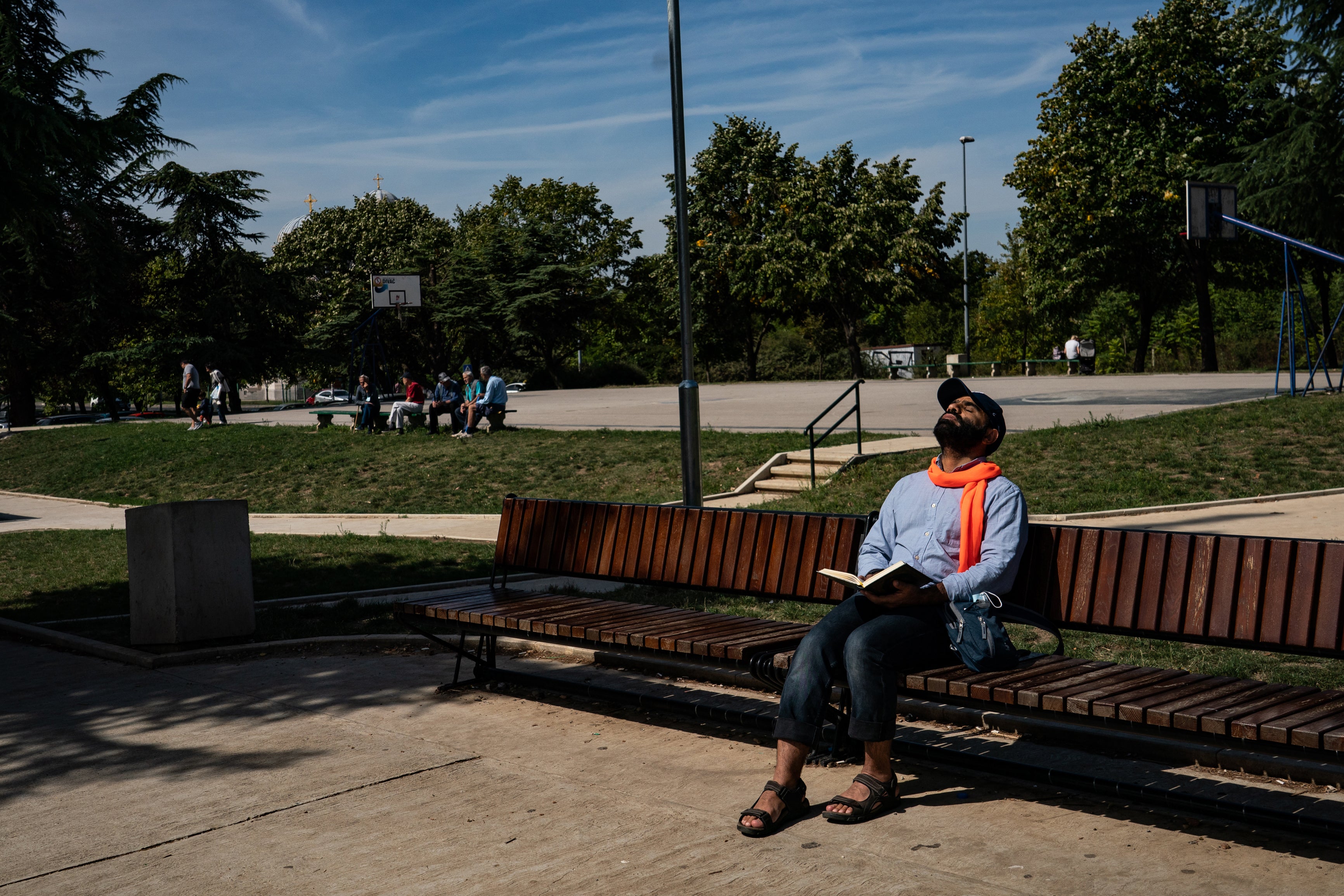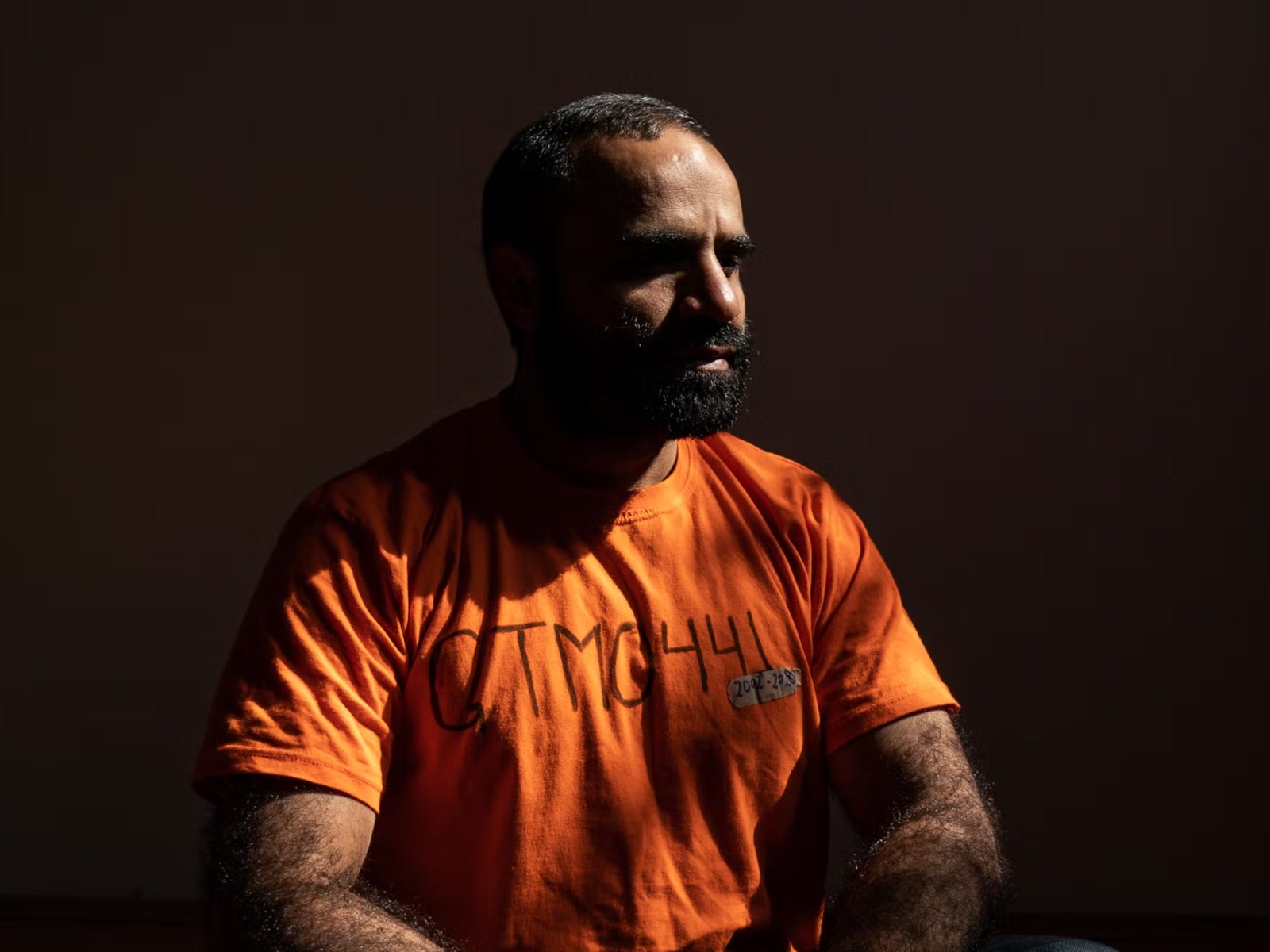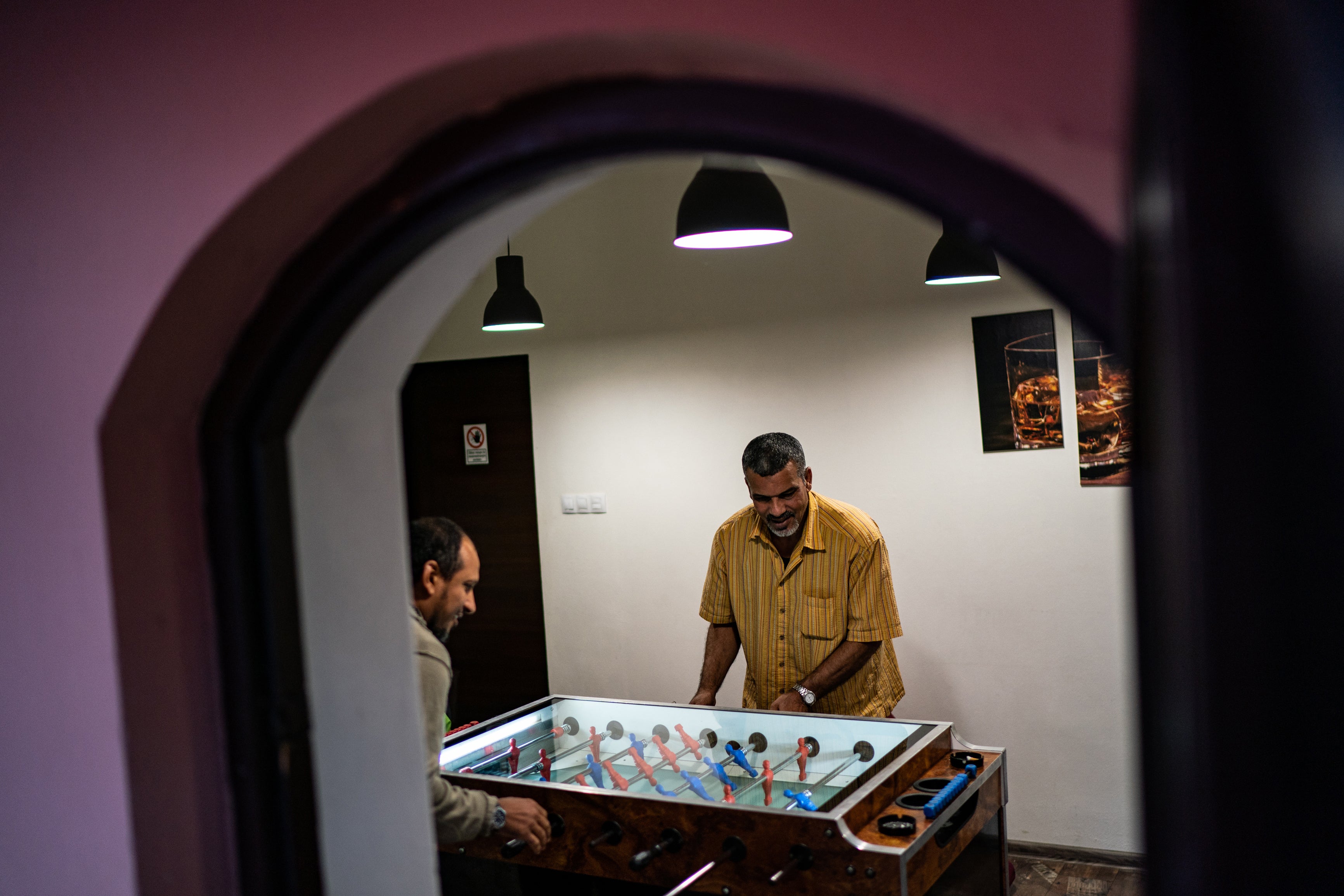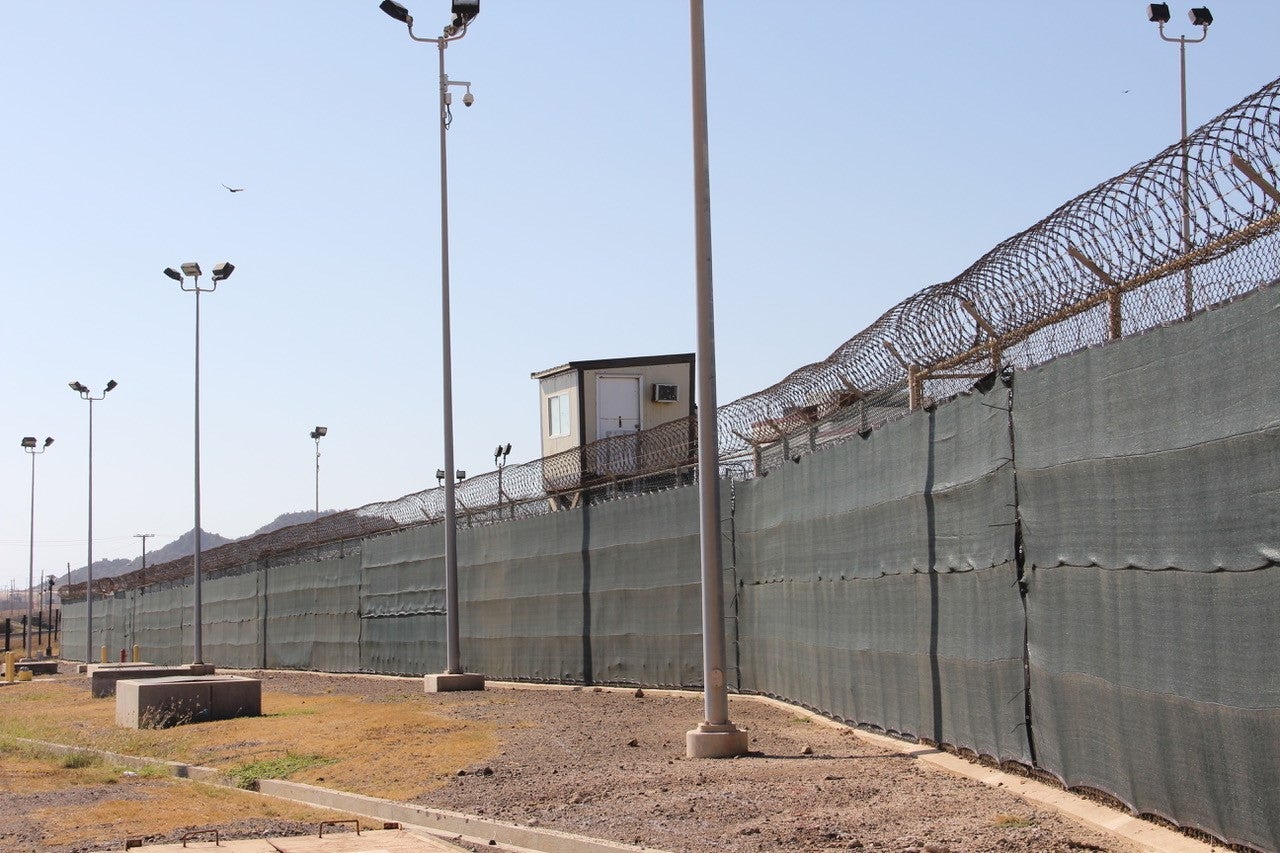Life after Guantanamo: The discarded men of one of America’s darkest chapters
Most of the 780 men detained in Guantanamo Bay were never charged, but still lost years of their lives. For many who are now out, freedom is hard to attain, writes Abigail Hauslohner and Salwan Georges

It was the first day of his fourth month without work, and Hisham Bin Ali Bin Amor Sliti was feeling increasingly agitated – like a caged animal. That's how they treat him, he thought: like an animal. He was 5,500 miles and seven years away from Guantanamo Bay, where he was locked up for more than a decade, but Sliti still felt like a prisoner.
He had encountered roadblock after roadblock as he tried to rebuild his life in this Central European country that had agreed to resettle him. Now, he was composing yet another angry missive to the Slovak government, the only recourse for his grievances since the Americans left him here.
“I don’t have money to pay for energy for my apartment, and for food, I don’t know what to do about it,” he texted in English to the director of migration for the country’s interior ministry, Jan Orlovsky. “You brought me to your country with agreement, it is unbelievable that you are letting us walk on such a dark path.”
“If you don’t want us, take us back to Guantanamo,” Sliti tapped into his phone. “Contact the US government to find a solution to this issue.”
The response he got made him even angrier. “Dear Hisham, as you wish,” read the message from Orlovsky. “I will let the US government know about your preference to live in a solitary confinement in Cuba.”
Sliti arrived at the military prison at Guantanamo Bay, Cuba, in 2002, as the facility was rapidly filling with people the US government had apprehended abroad in its new war on terror. Like the vast majority of the 780 men eventually detained there, he was never charged with a crime.
When Sliti was released after 12 years, the US sent him to Slovakia, instead of home to Tunisia.

By that point, the US government was increasingly sending its former detainees to third countries for resettlement. Though a majority of former Guantanamo detainees were returned to their home countries, about 20 per cent have ended up elsewhere. In many cases, third countries were the safest options: far from war zones and in the hands of American allies.
But forging a life in Slovakia has been hard, Sliti said. Stigma, poverty and continuing persecution on top of the years of abuse endured at Guantanamo present formidable obstacles to resettlement, said former detainees and their attorneys.
The Americans falsely imprisoned and tortured them, deprived them of any public exoneration, and then abandoned them after their release, the men said. “They destroyed my life,” Sliti, 55, said of the US government. “I am sick now, I am mentally sick. Every day, I get angry with my wife. It’s not good. I am stressed. But America doesn’t care what happens to people after they leave Guantanamo.”
The interrogators didn’t understand that each move, each interrogation, each beating brought all of us closer together despite our differences instead of pushing us further apart
The experiences of Sliti and more than a dozen other former detainees and family members interviewed by The Washington Post underscore the enduring challenge of bringing an end to one of America’s most fraught national security decisions: its establishment of a military prison outside the American legal system.
Since its opening in 2002, Guantanamo has become a global symbol of American abuse and a recruitment tool for terrorists. The prison turned 20 on 11 January, with 39 detainees remaining. Only two of them have been convicted. It remains unclear when the other 10 men who face terrorism charges, including the five implicated in the 9/11 terrorist attacks, will stand trial.
If President Joe Biden follows through on his goal to close Guantanamo, he will first need to find places to send the 27 remaining men whom the US has never charged. They are a collection of Yemenis, Pakistanis, Algerians and others, the majority of whom by the end of 2022 will have spent 20 years in US custody. Many now struggle with chronic health and psychological problems, their attorneys say.
If transferred, they will join Sliti and hundreds of others spread across the globe, endeavouring to forge lives after Guantanamo, the discarded men of one of America’s darkest chapters.

Though many live far from public view and each other, there is an informal network. They trade advice, news and jokes in text-message chains. And when things get bad, they call each other.
When Sliti is having a hard time, he talks to Mansoor Adayfi. Adayfi, 39, now lives in Serbia, far from the western mountains of Yemen, where he grew up. Seventeen years younger than Sliti and nearly a foot shorter, he is the charismatic intellectual to Sliti's hulking gruffness. The two might never have been friends had they met in the outside world.
But Guantanamo proved to be a strong unifier. “The interrogators didn’t understand that each move, each interrogation, each beating brought all of us closer together despite our differences instead of pushing us further apart,” Adayfi wrote in Don't Forget Us Here, his memoir of 14 years at the prison, published in August. “This place called Guantanamo had created a brotherhood among us and now we looked out for each other wherever we were, no matter who we were.”
Adayfi lives a lonely life in Belgrade, with no family or close friends nearby. What keeps him company most days is a steady ping of phone messages from other former detainees or their relatives, many of them hundreds of miles away and grappling with the legacy of their own imprisonment.

“I think one of the reasons my brothers call me is because I listen to them and try to help in any way I can, sincerely try to help,” Adayfi said. “They want to talk because they live under pressure, frustration.”
“We had PTSD. We couldn’t focus. We got terrible headaches. Our bodies were breaking down,” Adayfi wrote in Don't Forget Us Here. “I worried our scars wouldn’t heal and go away, even when we were released.”
Adayfi’s sister and brother died while he was in Guantanamo. He also lost friends in the prison, who died under murky circumstances. The military called them suicides. He doesn’t believe it. “I think I’m going to be killed, too,” said Adayfi. “You’ll see.”
Like many of those who wound up at Guantanamo, Adayfi was captured in Afghanistan by US-allied Afghan militants, and then, he said, “sold” to the Americans in the chaotic months following 9/11, as the Bush administration launched a desperate, often ad hoc search for members of al-Qaida.
Adayfi was 19 when he arrived at the prison. He told interrogators that he had gone to Afghanistan for scholarly research. But he also, at various turns in his imprisonment, told them different stories – including that he was a jihadist, and that he was glad for 9/11. It was a reaction, he says now, to the rage he felt at the mistreatment and humiliation by American captors.
“I was angry. I was hurt. I said things that I didn’t mean, but I was in a deep, dark hole,” he recalled in his memoir. “I wanted to teach them that they couldn’t kill and torture us and expect us to love them for it.”

After 13 years of labelling Adayfi a dangerous al-Qaida commander, the US government downgraded its assessment, saying that it was “unclear whether he actually joined” al-Qaida and was “probably ... a low-level fighter,” according to government documents. The Americans released him to Serbia the following year.
By that point, Adayfi had spent his entire adult life in US custody. By his estimate, he had weathered hundreds of interrogations and beatings. He had kidney problems, persistent headaches and anxiety. He had never gone to college, never had a career, never experienced love.
He knew little about Serbia, other than its “history killing many Muslims” in the 1990s during the Balkan wars. But in Belgrade, he sought to rebuild. He enrolled in a Serbian university, and finished the book he had started writing at Guantanamo. He published articles, spoke out on behalf of current and former detainees and won a non-fiction literary award. Last fall, he submitted his honours thesis: a research paper and business proposal for a programme to integrate former detainees into society that he wrote in English, a language he taught himself at Guantanamo.
But it has also been a peculiar sort of success, juxtaposed against his intense unhappiness. One evening, as he fought back a cold, he stared at his pallid face in a small mirror and then washed it in the kitchen sink in an effort to make himself presentable for a TV interview about his book.
Sometimes his anxiety becomes so overwhelming that Sliti needs to retreat inside for days and shut himself off from friends and family
“How is the lighting?” Adayfi asked with a grin. As his laptop screen lit up, he switched on the ring light that he found online for $15 – after watching some YouTube tutorials on TV appearances – and was clicking between settings: yellow, white, off-white.
Adayfi is insistent that the world should think about what happened at Guantanamo the way he does, about what is still happening there.
As he sat at his small desk, next to the couch he uses as a bed, he spoke over Zoom to an English-language, state-run Chinese news channel about his book. “Imagine American kids being kidnapped and imprisoned for five, 10, 15 years, without any kind of charge or trial, without any rights,” he began. “This is still Guantanamo. . . . It’s outside the law,” he said. “It’s baseless.”
As he spoke, viewers could see an animated man in a bright orange scarf – a nod to the Guantanamo jumpsuits – sitting before a white wall. They couldn’t see the wall full of post-it notes with which he has chronicled in Arabic and colour-coded by year all of the challenges and indignities he has encountered since he got to Serbia.
There were post-its for each interrogation by Serbian police, and for each time they scared off new friends he had made. There were post-its for each step in his still-fruitless search for a wife, including the $15,000 cost of a dowry, were he to pursue an arranged marriage to a Yemeni.

“I cannot live here,” he said. He has decided he needs to get out of Serbia. But where? Or how?
Like with Adafyi, the US government’s position on Sliti shifted as his captivity went on. They linked him to a Tunisian terrorist organisation and said he had been plotting with terrorists in Europe, where he had lived for a few years before moving to Afghanistan. Then in early 2010, following a review of all detainees ordered by the Obama administration, the government determined he was not a significant threat to the United States and recommended he be transferred out of Guantanamo “as appropriate arrangements can be made.”
Sliti has always maintained that he went to Afghanistan because he had become addicted to drugs in Europe, and a cousin thought that living in a strict Islamic society might straighten him out. But he has never had the opportunity to prove his case.
In November 2014, the US military delivered Sliti, blindfolded and shackled – along with a Yemeni detainee, Hussein Salim Al-Marfadi – to Slovak custody at the military airport a few miles from Zvolen, where the two now live. They were the last of eight transferred to Slovakia during the Obama administration.
Zvolen is nestled in the misty foothills of the Slovak Central Mountains, 120 miles from the capital, Bratislava. It’s not big. There’s a town square lined with cafes and an old stone fortress, along with cornfields spread amid the rows of large, Soviet-style apartment blocks. Sliti, who is 6ft tall, barrel-chested and darker-skinned than many of his neighbours, has felt like an outsider since the day he arrived.

Sometimes his anxiety becomes so overwhelming that Sliti needs to retreat inside for days and shut himself off from friends and family. The first time he did that, six months after his arrival in Slovakia, he said that police burst into his apartment, guns drawn, to see what he was doing. “After they put handcuffs on me, they punched me twice in my face. I told them, ‘If you are men, uncuff my hands and we’ll go outside.’” Slovak officials declined to answer questions about the incident.
“What does this mean – life after Guantanamo?” Sliti said one afternoon, after another hour spent clicking through low-paid job listings on LinkedIn. “Life is s*** after Guantanamo.”
At first, the Slovak government housed the men in an apartment building maintained and monitored by the government. Later, it moved some of them further east, to a town 60 miles from the Ukrainian border. Sliti and Al-Marfadi stayed in Zvolen, while the others eventually moved to Bratislava.
For years, the men received modest government housing stipends. But in a text message last fall, Orlovsky told The Post that the Slovak government ended its assistance programme at the end of 2021. He declined to respond to other questions about his interactions with Sliti and other detainees. After The Post sent questions to Orlovsky and other government officials, Sliti said Orlovsky told him that former detainees would also receive lump-sum payouts from what was left of the assistance budget.
Vincent M Picard, a spokesman for the US State Department's Bureau of Counterterrorism, said the United States has “occasionally assisted receiving countries with the cost of resettling former detainees” but that the security aspect of the agreements are “time-limited.” Once they have expired, “the US government does not exercise any sort of custody over the treatment of resettled individuals,” he said.

In Slovakia, Sliti wanted to be a mechanic, just as he had trained to be in his younger years, before he migrated to Europe and everything went wrong. He completed a course to update his skills, took a brief introduction to the Slovak language and found short-term jobs working on cars and then on train engines.
He found a wife, too: a Slovak convert to Islam named Jana, who has shown patience and understanding with his mood swings and his “chronic mistrust,” as a Slovak psychologist, who evaluated Sliti over 13 sessions, described it.
But he and Jana say he has been repeatedly harassed by the police. Local media outlets have splashed his face across their pages. “Former Guantanamo prisoner walks free in Slovakia,” read one magazine report, alongside blurry, zoomed-in photos of Sliti running errands. He feels stares every time he leaves the house, which can sometimes lead to what his psychologist characterised as “frequent, sudden outbursts of anger.”
And now he has been unemployed for more than half a year; fired from a job fixing train engines after an angry outburst at his boss, in which Sliti says he made a gesture that meant “cut it out,” and which he says his boss thought was pantomiming a beheading.
Last year, Sliti found a new job, as a van driver, and was briefly buoyed by the thought of himself at the wheel of a van, hauling long distances on his own. But the position would have required travel through Italy and Austria. And when Jana reached out to Orlovsky to see if the government would allow it, she was rebuffed.
“Congratulations to Hisham,” Orlovsky responded in a text message. “I am currently at the airport with the director of police and Hisham will not be able to travel to neighbouring countries so soon.”

The realisation that life after Guantanamo was not quite freedom from Guantanamo crept up on Adayfi during his first year in Serbia. Officials seemed to warn off every Serb he had a conversation with at the library or the mosque. And after the American TV show PBS Frontline came to interview him, the police showed up, beating and detaining him, he said.
Adayfi “ended up getting roughed up and eventually detained for a time by secret police for talking with us,” the reporter Arun Rath later wrote in an essay. “After we got back to the states, [Adayfi] called me when he found cameras and listening devices hidden throughout his government apartment, and began ripping them out of the walls. I was still on a video call with him when secret police armed with machine guns showed up and took him away,” Rath wrote.
The Serbian government did not respond to repeated requests for comment.
Adayfi and his attorney said the Serbian government provides him a small stipend and covers the cost of his apartment and some of his university studies. But a government minder calls to ask him about innocuous acquaintances. He suspects secret police operatives enter his apartment when he’s not there, and he said he has found listening software on his government-provided phone. Neither the Serbian nor the Yemeni government has provided him a passport.
The police had come to his apartment again the week before to question his stepdaughter about whether Sliti beat his wife or forced her to convert to Islam
“We are still being treated like terrorists,” Adayfi said. “For the last five years, I’m trying to build my life. I’m trying to study, I published a book. But that doesn’t prove it to them. It’s still just: 'He's bad.' No matter what, as long as you were in Guantanamo.”
Last year, the government moved Adayfi from the downtown apartment it initially gave him to a neighbourhood on Belgrade’s outskirts. He feels even more isolated, and more conspicuous, with his brown skin and thick dark beard, and his poor grasp of Serbian.
There is no halal meat around here, so he mostly eats lentils, yogurt, vegetables, and bread with American peanut butter – a favourite that he discovered at Guantanamo. In the building where he has lived for the past year and a half, he has only ever spoken with one neighbour.
The neighbour told Adayfi he was surprised to see anyone living in that apartment. “We thought it was haunted,” he said, remarking that it had long been unoccupied. “What brought you here?”
“Trust me,” Adayfi replied. “You don’t want to hear it.”
The terms of detainee transfer deals are kept secret, and there has been no consistent strategy of support to former detainees following their release, current and former officials said. Daniel Fried, who served as President Barack Obama’s first special envoy for Guantanamo’s closure, said the US government wanted the men “to have decent lives” after they left the prison. “We helped some of them find jobs. We helped one find a wife,” he said. “That’s not charity,” he added. “It’s a lot easier to treat them decently than end up as a new target.”

Picard, the State Department spokesman, said that transfer arrangements are “based on mutually reached security and humane treatment assurances” between the United States and host governments.
But these assurances don’t answer the larger question of what, if anything, the United States owes the hundreds of men it held for years or decades without charges.
In 2010, the British government settled a lawsuit with several former Guantanamo detainees, agreeing to pay out millions of dollars in damages. The European Court of Human Rights in 2014 ordered the government of Poland to pay damages to two other detainees whom the CIA tortured at a secret “black site” there. The US Supreme Court recently heard the case of one of those men, who is suing to compel the government to release evidence to Polish authorities, who are now investigating the country’s involvement in the black site.
But the vast majority of detainees have received no damages or direct assistance, from the US government.
“The larger-scale solution [involves] the utter lack of accountability,” said Katie Taylor, the deputy director of Reprieve, an organisation that has provided legal representation to current and former Guantanamo detainees. “It shouldn’t be that men like Hisham [Sliti] are put in countries to build their lives, but without any sort of pension or recompense,” she said. “He shouldn’t be having financial struggles. It should be the case where the US should be paying for what it did.”
As the United States withdrew its last troops from Afghanistan in August, and the Taliban consolidated its control, Adayfi’s group text chain with other former detainees lit up.
“The American forces took their dogs, but they left the people behind,” read a tweet that one former detainee shared to the group chat. Another shared a tweet from a Taliban account that said, “The goal we fought for is to apply Islamic law in the country.”

Adayfi added a photo of Mohammed Nabi Omari, who was also detained in Guantanamo. “And now look where he is!” Adayfi said, shaking his head. Omari had recently been named governor of the Afghan province of Khost.
He wondered if other disenfranchised Muslims would begin flocking to Afghanistan again, just as hard-liners and extremists had found safe haven there under the Taliban before 9/11. It would be an ill-fated idea, he was certain. But he worried about others – not just former detainees, but fellow Muslims in Europe, perhaps, who feel alienated by racism or a lack of opportunity.
A few weeks after the fall of Kabul, Sliti and Al-Marfadi decided to travel from Zvolen to the US Embassy in Bratislava. They took Sliti's car, a dark Opel with a loop of prayer beads hanging from the rearview mirror.
It was the day before the 20th anniversary of the 11 September 2001, attacks, which they hadn’t realised until they approached the US embassy and noticed the 9/11 photo exhibit out front. They paused and stared in silence.
Sliti was already on edge. The police had come to his apartment again the week before to question his stepdaughter about whether Sliti beat his wife or forced her to convert to Islam. At the embassy guard post, they announced themselves: two former Guantanamo detainees who wanted to speak to someone from the embassy about their problems.
Twenty minutes later, an American came out of the embassy and met Sliti and Al-Marfadi outside the fence. Sliti’s anger melted into a nervous optimism. Maybe this man would hear him, and help. Sliti told the American about his job and his mental health challenges. Al-Marfadi told him about the stigma and their isolation.
“Fix our problem,” Sliti said. “The Americans brought us here.”
The American listened patiently, then took down their contact information and promised to check with Washington. The men retreated back to Zvolen, briefly confident that they may have accomplished something.
They never heard from the embassy.
© The Washington Post
Join our commenting forum
Join thought-provoking conversations, follow other Independent readers and see their replies
Comments


Bookmark popover
Removed from bookmarks